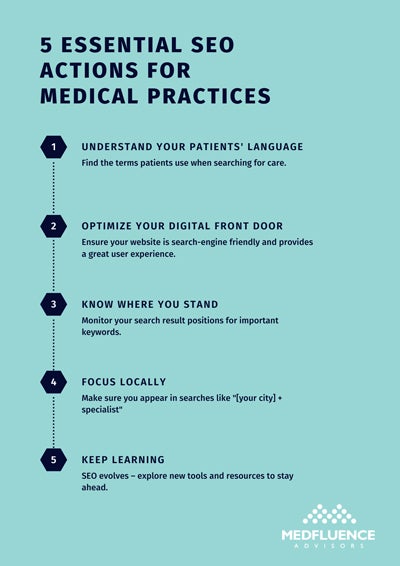Free SEO for Medical Practices: Attract More Patients You Can Help
You might have stumbled upon this article because you’re a dedicated physician, eager to reach more patients who genuinely need your specialized care. Years of rigorous training have honed your expertise. You’re passionate about finding solutions for those facing complex health challenges, and you understand the profound impact your services can have.
Every day, you strive to understand your patients’ needs and help them find effective, long-term solutions. Despite your expertise, one challenge persists – reaching the wider community of patients who could greatly benefit from your specialized care. In a crowded digital landscape, ensuring your practice stands out can feel overwhelming, especially when competing with large healthcare institutions that dominate search results.
We understand these frustrations. Traditional marketing approaches have limited reach in today’s digital age, where potential patients often turn to online searches to seek specialists like yourself. Mastering SEO (Search Engine Optimization) is crucial for any modern practice, but it can feel daunting and time-consuming to learn alongside your core responsibilities.
The good news is that you don’t need to spend a fortune or become an overnight tech expert to make a difference. There’s a whole world of powerful, free SEO tools at your fingertips, ready to help you connect with those who need you most. These tools serve as your digital allies—analyzing your website, uncovering the terms patients use when searching for specialized care, and highlighting opportunities to gain a competitive advantage.
With the right strategy, you can transform your practice into a beacon of hope for patients seeking the specialized care you provide.
Why You Need SEO Tools
Let’s start by decoding the term “SEO.” In essence, Search Engine Optimization (SEO) is the art and science of making your website more appealing to search engines like Google. Think of it as improving your ranking on the digital shelves. When someone searches for terms related to your specialty (“dermatologist for psoriasis”, “pain management near me,” etc.), you want your practice’s website to appear as close to the top of the results as possible.
Why does this matter so much in medical marketing? Consider these facts:
- The Zero-Click Search: More than half of Google searches now end without the user clicking through to any website. Answers are provided directly on the search results page. To gain any visibility, you need to understand how to optimize your content for those top spots.
- Patient Trust: People often perceive websites that rank high in organic search results as being more authoritative and trustworthy.
- Targeted Audience: Effective SEO helps you connect with people already actively searching for the types of services you provide. They’re not just browsing; they have a specific need.
SEO tools act like your digital detective agency. Imagine them as a team of expert investigators, tirelessly working to answer these crucial questions for your medical practice:
- What terms are patients searching for?
- How can I improve my website for a better patient experience?
- What are my competitors doing online?
- How do I track progress and measure success?
Using the data these tools provide, you can make informed decisions. These decisions will optimize your website, content, and marketing strategies to ultimately reach more patients who trust you and benefit from the specialized care you provide.
Benefits of Using SEO Tools

SEO tools go beyond just helping you understand the technical jargon. They provide tangible advantages for your medical practice:
- Enhanced Website Visibility
Think of your website as an extension of your practice, a 24/7 virtual waiting room where potential patients can discover the answers they seek, even outside of office hours. SEO tools help ensure it gets noticed.SEO encompasses strategies to improve website structure, image optimization, and more. Tools will give you concrete steps to enhance the overall patient experience, which is increasingly important to search engines.
A well-optimized website will also show up not only for general searches (e.g., “cardiologists for heart failure”) but also for location-based queries (“best cardiologist near me”)
- Increased Organic Traffic From Relevant Searches
It’s exciting to see website traffic numbers climb, but true engagement comes from attracting those with genuine health concerns relevant to your skills. SEO tools help pinpoint the searches your ideal patients are making.People don’t just search for diagnoses; they seek help for daily struggles (“how to manage back pain”) or explore potential treatments (“minimally invasive options for…”). Tools reveal opportunities to provide valuable information.Optimizing for different stages of the search process – awareness, consideration, decision-making – casts a wider net and attracts patients at any point along their healthcare journey.
- Data-Driven Insights to Improve Website and Content
Remove the guesswork! Discover which pages perform well, how patients interact with your site, and what content resonates most. This empowers you to make informed decisions for continuous improvement.SEO tools replace assumptions about your website with hard data. Are your “About Us” pages getting overlooked? Is a particular blog series driving traffic? This allows for focused refinement, not just random tweaks.You can also learn how long people stay on specific pages, where they click, and where they leave. This tells you what content is truly engaging and which sections may need improvement.Trends in medical searches evolve. Data keeps you ahead of the curve, allowing you to refine your content strategy so it always feels relevant and helpful.
- Competitive Advantages in a Crowded Market
You should know about your competitors. SEO tools don’t just analyze your website; they offer competitive insights. What keywords do your competitors target? Where do they excel or where do they fall short?Competitive analysis highlights areas where you can offer something unique – perhaps a special focus on patient education, in-depth Q&As, or personalized case studies.The online landscape shifts. Tools monitor your competitors, alerting you if they try new tactics. This lets you respond quickly, protecting your visibility.
SEO is not a one-time fix. It’s an ongoing journey, fueled by the information these tools provide. It is a powerful starting point, but their real value comes from how you interpret the data and apply it strategically to serve your specific patient base and practice goals.
Best Free SEO Tools for Medical Practices
SEO may still feel a bit intimidating, but fear not! The following free tools we have categorized to put control back in your hands. They’ll demystify the process, guiding you to confidently improve your practice’s online presence. Here’s your personalized toolkit for reaching more of the patients who need you:
Keyword Research Tools

Think of keyword research as understanding the language of your patients. SEO tools help you tap into the exact words and phrases people use when searching for treatments, specialists, or information about their health conditions. Let’s explore some of the best free options:
- Ubersuggest
Ubersuggest is a powerful tool that excels at uncovering long-tail keywords. These are more specific phrases patients might search for, like “minimally invasive bunion surgery” or “holistic treatment for migraines.” By targeting these, you attract a highly relevant audience with less competition than broader terms.
- AnswerThePublic
AnswerThePublic is a visually appealing tool that reveals the questions patients ask. Instead of just keywords, you’ll uncover queries like “What causes chronic joint pain?” or “How do I know if I need hip replacement?” This insight into patient concerns helps you create content that directly addresses their needs and establishes trust.
- Google Keyword Planner
As a Google product, this tool offers reliable data pulled from actual search behavior. It helps you discover variations on core keywords and shows the average search volume for different locations. This is vital for ensuring your content aligns with what patients in your area are actively searching for.
- Google Trends
This tool goes beyond current search volume to show how interest in keywords changes over time. You might see that searches for “anxiety management techniques” spike during stressful periods. Trends data helps you plan timely, relevant content that resonates with patient needs.
It’s not enough to just target medical jargon. Using the right keyword research tools helps you connect with patients on a human level, speaking their language, and understanding their true intent behind a search.
Technical SEO Tools
It’s not just about the content you create – the nuts and bolts of your website matter too! Technical SEO ensures search engines can easily understand and index your site correctly, and that it provides a smooth, user-friendly experience for patients. Here are some free tools to help:
- Neil Patel’s SEO Analyzer
Get a comprehensive website audit with this powerful tool. It analyzes various technical aspects, ranging from page speed to broken links, and – most importantly – provides clear, actionable fixes. This is vital for practices that haven’t had a technical check-up in a while.
- Google PageSpeed Insights
Patients are rarely patient with slow websites! This tool measures your site’s loading speed on both mobile and desktop, providing specific recommendations to address any issues. A faster website makes both patients and search engines happy.
- Sitechecker
Search engines rely on “crawling” to discover your content. Sitechecker simulates this process, uncovering technical errors like missing meta descriptions, 404 errors, or duplicate content. Resolving these issues ensures search engines can fully index your site, maximizing your potential rankings.
Rank Tracking & Analytics Tools
Knowing where you stand – and understanding how to improve – is key to a successful SEO strategy. These free tools provide a wealth of data to guide your decision-making:
- Google Analytics/Google Analytics 4
Consider this the mission control for your website. Analytics tracks everything from how many visitors you get and where they come from, to which pages they spend time on and what actions they take (like booking a consultation). This patient behavior data highlights content topics that resonate and reveals potential bottlenecks in your patient journey.
- Google Search Console
Search Console is somewhat of a direct line of communication with Google. It shows you which search terms lead people to your website, your average ranking position for those searches, and any technical issues Google finds while indexing your site. This information is essential for fine-tuning your keyword strategy and making the necessary adjustments for better rankings.
Beyond the Tools: Essential Strategies for Success
Even the most sophisticated SEO tools can’t compensate for poorly written or irrelevant content. Always prioritize creating valuable, well-researched information that addresses patient needs and establishes you as an authority in your field. Think of it this way: SEO tools help people find your content, but it’s the quality of that content that will keep them coming back and ultimately convert them into patients.
Focus on Local SEO
For most medical practices, attracting patients from within their geographic area is crucial. Local SEO tactics help you stand out in searches like “dermatologist near me” or “[your city] + pain management specialists”. This involves optimizing your website, managing your “Google My Business” profile, and building citations by mentioning your practice in respected local directories.
Stay Updated
SEO is a dynamic field. Search engine algorithms change, new tools emerge, and patient search behaviors evolve. Dedicate some time to regularly explore new resources, take online courses, or follow reputable SEO blogs. Continuous learning will ensure your practice remains adaptable and stays ahead of the digital curve.
Always remember that SEO is a marathon, not a sprint. The tools discussed in our guide provide a powerful foundation, but true success comes from combining those tools with high-quality content, an understanding of local search, and a commitment to continual growth.
Next Steps: Your SEO Jumpstart Checklist
The tools mentioned here are a powerful start, but how do you turn this knowledge into action? To make things easier, we have created a simple checklist to guide your SEO journey:
- Understand Your Patients’ Language: Use free keyword research tools (like Ubersuggest or AnswerThePublic) to see what people search for related to your specialty.
- Optimize Your Digital Front Door: Run your website through a technical audit tool (like Neil Patel’s SEO Analyzer) to fix any errors that hurt your search rankings.
- Know Where You Stand: Use rank tracking tools (Google Search Console is a great start) to monitor your positions for important keywords in your area.
- Focus Locally: Make sure your website and “Google My Business” profile are optimized for location-based searches.
- Keep Learning: Dedicate time to exploring new SEO resources and tools. This field is constantly changing, and staying adaptable is key.

Unlock Your Practice’s Potential with Free SEO
The digital landscape may seem overwhelming, but the free SEO tools we’ve explored hold immense power to transform your practice’s online presence. They give you the keys to connect with patients, rise above competitors, and build a reputation as a trusted provider of cutting-edge care.
Now is the time to experiment! Choose one of the tools recommended in this guide and start exploring. There’s no one-size-fits-all solution – finding the perfect combination for your individual practice is part of the journey. Remember, SEO is a continual process. Embrace the learning, be patient with the results, and celebrate every improvement along the way.


